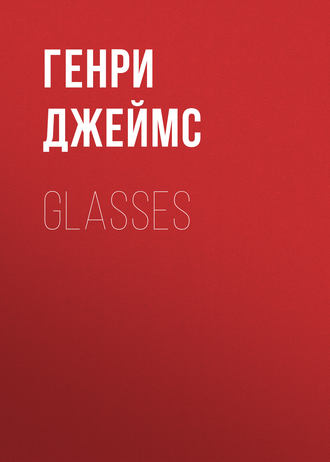
Генри Джеймс
Glasses
CHAPTER V
I had been again with my mother, but except Mrs. Meldrum and the gleam of France had not found at Folkestone my old resources and pastimes. Mrs. Meldrum, much edified by my report of the performances, as she called them, in my studio, had told me that to her knowledge Flora would soon be on the straw: she had cut from her capital such fine fat slices that there was almost nothing more left to swallow. Perched on her breezy cliff the good lady dazzled me as usual by her universal light: she knew so much more about everything and everybody than I could ever squeeze out of my colour-tubes. She knew that Flora was acting on system and absolutely declined to be interfered with: her precious reasoning was that her money would last as long as she should need it, that a magnificent marriage would crown her charms before she should be really pinched. She had a sum put by for a liberal outfit; meanwhile the proper use of the rest was to decorate her for the approaches to the altar, keep her afloat in the society in which she would most naturally meet her match. Lord Iffield had been seen with her at Lucerne, at Cadenabbia; but it was Mrs. Meldrum’s conviction that nothing was to be expected of him but the most futile flirtation. The girl had a certain hold of him, but with a great deal of swagger he hadn’t the spirit of a sheep: he was in fear of his father and would never commit himself in Lord Considine’s lifetime. The most Flora might achieve was that he wouldn’t marry some one else. Geoffrey Dawling, to Mrs. Meldrum’s knowledge (I had told her of the young man’s visit) had attached himself on the way back from Italy to the Hammond Synge group. My informant was in a position to be definite about this dangler; she knew about his people; she had heard of him before. Hadn’t he been a friend of one of her nephews at Oxford? Hadn’t he spent the Christmas holidays precisely three years before at her brother-in-law’s in Yorkshire, taking that occasion to get himself refused with derision by wilful Betty, the second daughter of the house? Her sister, who liked the floundering youth, had written to her to complain of Betty, and that the young man should now turn up as an appendage of Flora’s was one of those oft-cited proofs that the world is small and that there are not enough people to go round. His father had been something or other in the Treasury; his grandfather on the mother’s side had been something or other in the Church. He had come into the paternal estate, two or three thousand a year in Hampshire; but he had let the place advantageously and was generous to four plain sisters who lived at Bournemouth and adored him. The family was hideous all round, but the very salt of the earth. He was supposed to be unspeakably clever; he was fond of London, fond of books, of intellectual society and of the idea of a political career. That such a man should be at the same time fond of Flora Saunt attested, as the phrase in the first volume of Gibbon has it, the variety of his inclinations. I was soon to learn that he was fonder of her than of all the other things together. Betty, one of five and with views above her station, was at any rate felt at home to have dished herself by her perversity. Of course no one had looked at her since and no one would ever look at her again. It would be eminently desirable that Flora should learn the lesson of Betty’s fate.
I was not struck, I confess, with all this in my mind, by any symptom on our young lady’s part of that sort of meditation. The one moral she saw in anything was that of her incomparable aspect, which Mr. Dawling, smitten even like the railway porters and the cabmen by the doom-dealing gods, had followed from London to Venice and from Venice back to London again. I afterwards learned that her version of this episode was profusely inexact: his personal acquaintance with her had been determined by an accident remarkable enough, I admit, in connexion with what had gone before—a coincidence at all events superficially striking. At Munich, returning from a tour in the Tyrol with two of his sisters, he had found himself at the table d’hôte of his inn opposite to the full presentment of that face of which the mere clumsy copy had made him dream and desire. He had been tossed by it to a height so vertiginous as to involve a retreat from the board; but the next day he had dropped with a resounding thud at the very feet of his apparition. On the following, with an equal incoherence, a sacrifice even of his bewildered sisters, whom he left behind, he made an heroic effort to escape by flight from a fate of which he had already felt the cold breath. That fate, in London, very little later, drove him straight before it—drove him one Sunday afternoon, in the rain, to the door of the Hammond Synges. He marched in other words close up to the cannon that was to blow him to pieces. But three weeks, when he reappeared to me, had elapsed since then, yet (to vary my metaphor) the burden he was to carry for the rest of his days was firmly lashed to his back. I don’t mean by this that Flora had been persuaded to contract her scope; I mean that he had been treated to the unconditional snub which, as the event was to show, couldn’t have been bettered as a means of securing him. She hadn’t calculated, but she had said “Never!” and that word had made a bed big enough for his long-legged patience. He became from this moment to my mind the interesting figure in the piece.
Now that he had acted without my aid I was free to show him this, and having on his own side something to show me he repeatedly knocked at my door. What he brought with him on these occasions was a simplicity so huge that, as I turn my ear to the past, I seem even now to hear it bumping up and down my stairs. That was really what I saw of him in the light of his behaviour. He had fallen in love as he might have broken his leg, and the fracture was of a sort that would make him permanently lame. It was the whole man who limped and lurched, with nothing of him left in the same position as before. The tremendous cleverness, the literary society, the political ambition, the Bournemouth sisters all seemed to flop with his every movement a little nearer to the floor. I hadn’t had an Oxford training and I had never encountered the great man at whose feet poor Dawling had most submissively sat and who had addressed him his most destructive sniffs; but I remember asking myself how effectively this privilege had supposed itself to prepare him for the career on which my friend appeared now to have embarked. I remember too making up my mind about the cleverness, which had its uses and I suppose in impenetrable shades even its critics, but from which the friction of mere personal intercourse was not the sort of process to extract a revealing spark. He accepted without a question both his fever and his chill, and the only thing he touched with judgment was this convenience of my friendship. He doubtless told me his simple story, but the matter comes back in a kind of sense of my being rather the mouthpiece, of my having had to put it together for him. He took it from me in this form without a groan, and I gave it him quite as it came; he took it again and again, spending his odd half-hours with me as if for the very purpose of learning how idiotically he was in love. He told me I made him see things: to begin with, hadn’t I first made him see Flora Saunt? I wanted him to give her up and lucidly informed him why; on which he never protested nor contradicted, never was even so alembicated as to declare just for the sake of the point that he wouldn’t. He simply and pointlessly didn’t, and when at the end of three months I asked him what was the use of talking with such a fellow his nearest approach to a justification was to say that what made him want to help her was just the deficiencies I dwelt on. I could only reply without gross developments: “Oh if you’re as sorry for her as that!” I too was nearly as sorry for her as that, but it only led me to be sorrier still for other victims of this compassion. With Dawling as with me the compassion was at first in excess of any visible motive; so that when eventually the motive was supplied each could to a certain extent compliment the other on the fineness of his foresight.
After he had begun to haunt my studio Miss Saunt quite gave it up, and I finally learned that she accused me of conspiring with him to put pressure on her to marry him. She didn’t know I would take it that way, else she would never have brought him to see me. It was in her view a part of the conspiracy that to show him a kindness I asked him at last to sit to me. I dare say moreover she was disgusted to hear that I had ended by attempting almost as many sketches of his beauty as I had attempted of hers. What was the value of tributes to beauty by a hand that could so abase itself? My relation to poor Dawling’s want of modelling was simple enough. I was really digging in that sandy desert for the buried treasure of his soul.
CHAPTER VI
It befell at this period, just before Christmas, that on my having gone under pressure of the season into a great shop to buy a toy or two, my eyes fleeing from superfluity, lighted at a distance on the bright concretion of Flora Saunt, an exhibitability that held its own even against the most plausible pinkness of the most developed dolls. A huge quarter of the place, the biggest bazaar “on earth,” was peopled with these and other effigies and fantasies, as well as with purchasers and vendors haggard alike, in the blaze of the gas, with hesitations. I was just about to appeal to Flora to avert that stage of my errand when I saw that she was accompanied by a gentleman whose identity, though more than a year had elapsed, came back to me from the Folkestone cliff. It had been associated on that scene with showy knickerbockers; at present it overflowed more splendidly into a fur-trimmed overcoat. Lord Iffield’s presence made me waver an instant before crossing over, and during that instant Flora, blank and undistinguishing, as if she too were after all weary of alternatives, looked straight across at me. I was on the point of raising my hat to her when I observed that her face gave no sign. I was exactly in the line of her vision, but she either didn’t see me or didn’t recognise me, or else had a reason to pretend she didn’t. Was her reason that I had displeased her and that she wished to punish me? I had always thought it one of her merits that she wasn’t vindictive. She at any rate simply looked away; and at this moment one of the shop-girls, who had apparently gone off in search of it, bustled up to her with a small mechanical toy. It so happened that I followed closely what then took place, afterwards recognising that I had been led to do so, led even through the crowd to press nearer for the purpose, by an impression of which in the act I was not fully conscious.
Flora with the toy in her hand looked round at her companion; then seeing his attention had been solicited in another quarter she moved away with the shop-girl, who had evidently offered to conduct her into the presence of more objects of the same sort. When she reached the indicated spot I was in a position still to observe her. She had asked some question about the working of the toy, and the girl, taking it herself, began to explain the little secret. Flora bent her head over it, but she clearly didn’t understand. I saw her, in a manner that quickened my curiosity, give a glance back at the place from which she had come. Lord Iffield was talking with another young person; she satisfied herself of this by the aid of a question addressed to her own attendant. She then drew closer to the table near which she stood and, turning her back to me, bent her head lower over the collection of toys and more particularly over the small object the girl had attempted to explain. She took it again and, after a moment, with her face well averted, made an odd motion of her arms and a significant little duck of her head. These slight signs, singular as it may appear, produced in my bosom an agitation so great that I failed to notice Lord Iffield’s whereabouts. He had rejoined her; he was close upon her before I knew it or before she knew it herself. I felt at that instant the strangest of all promptings: if it could have operated more rapidly it would have caused me to dash between them in some such manner as to give Flora a caution. In fact as it was I think I could have done this in time had I not been checked by a curiosity stronger still than my impulse. There were three seconds during which I saw the young man and yet let him come on. Didn’t I make the quick calculation that if he didn’t catch what Flora was doing I too might perhaps not catch it? She at any rate herself took the alarm. On perceiving her companion’s nearness she made, still averted, another duck of her head and a shuffle of her hands so precipitate that a little tin steamboat she had been holding escaped from them and rattled down to the floor with a sharpness that I hear at this hour. Lord Iffield had already seized her arm; with a violent jerk he brought her round toward him. Then it was that there met my eyes a quite distressing sight: this exquisite creature, blushing, glaring, exposed, with a pair of big black-rimmed eye-glasses, defacing her by their position, crookedly astride of her beautiful nose. She made a grab at them with her free hand while I turned confusedly away.






